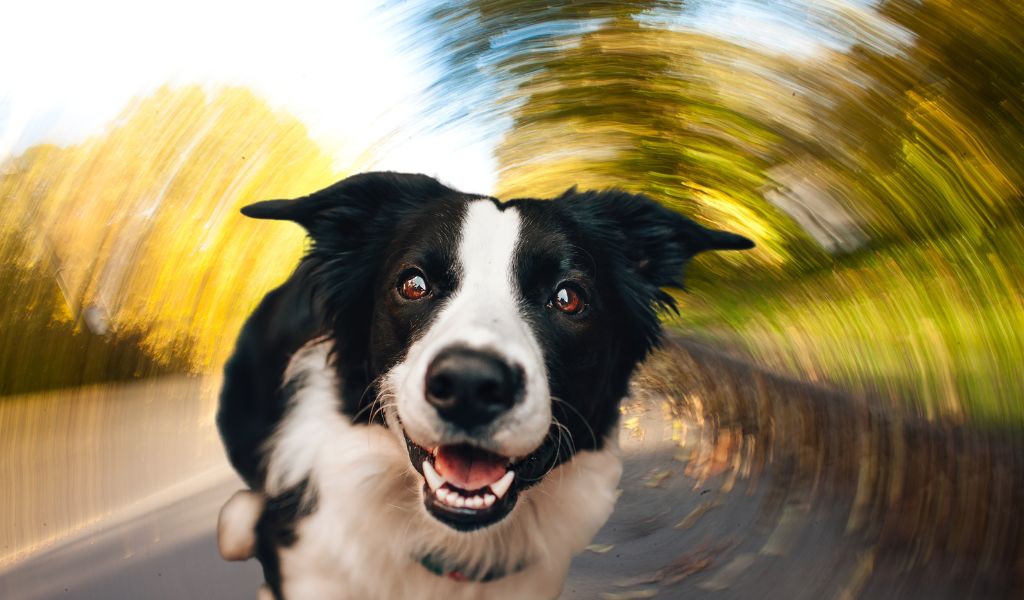Whether you’re a first-time dog owner or have had a pup for years, you may be wondering if dogs can get dizzy.
It’s an interesting question and, as it turns out, the answer is yes.
In this post, we’ll explore what causes dizziness in dogs and how to help them feel better. Keep reading to learn more.
Dogs can get dizzy and there can be a number of reasons for it. If your dog experiences regular bouts of dizziness then it’s important for you to take him to the vet so that he can be checked for any health problems.
What causes dizziness in dogs?
Dogs can experience dizziness for numerous reasons, ranging from motion sickness to bacterial infections.
Motion sickness, which is often caused by car rides, can make dogs become queasy and weak in the knees; this feeling of lightheadedness normally passes after a few minutes.
Hearing or sight impairments are another possible cause of dizziness in dogs, as is idiopathic vestibular disease.
This disorder affects some older dogs and causes unexpected balance problems that last anywhere from a few hours to several days.
Finally, dizziness could be symptomatic of something more serious—such as an ear infection or a brain tumor—and should be evaluated by a veterinarian right away.
A comprehensive physical exam and diagnostic tests can help to get to the bottom of any underlying medical problem that may be causing your pup to feel off-balance.
All in all, there are multiple possible causes of dizziness and it’s best to get your dog checked out if you have any concerns about their overall health.
[amazon fields=”B09BHJS3TF” value=”thumb” image_size=”large” image_alt=”Can a dog get dizzy”]
Can dogs get dizzy from spinning around?
Dogs generally don’t get dizzy when they are spinning around, such as when chasing their tails or doing other crazy dog things.
However, it is possible for a dog to become disoriented due to spinning if they are doing it too long or in an enclosed space.
If this happens, allow your pup some time to recover and give them plenty of water and a quiet place to relax.
What are the symptoms of dizziness in dogs?
The symptoms of dizziness in dogs can vary depending on the underlying cause, but some general signs to look out for are loss of balance, disorientation, nausea, vomiting, excessive salivation and lethargy.
If your dog is displaying any of these symptoms then it’s important to get them looked at by a vet so that they can be properly diagnosed and treated.
In some cases, medication may be prescribed to help ease the symptoms of dizziness.
How can you help a dog who is feeling dizzy?
If your dog is feeling dizzy, the most important thing you can do is to ensure they are in a safe and comfortable environment.
This means keeping them away from loud noises or sudden movements that could make their symptoms worse.
It’s also important to keep an eye on their hydration levels and provide them with plenty of water throughout the day.
You can also try gently massaging their ears or applying a cold compress to help alleviate any symptoms of dizziness.
Ultimately, it’s important to seek veterinary care if your dog is experiencing frequent episodes of dizziness as this could be indicative of an underlying medical condition.
Your vet will be able to provide a comprehensive diagnosis and treatment plan to help your dog to feel better.
It’s also worth noting that some dogs may be more prone to dizziness than others, so it can be helpful to keep an eye out for any changes in behaviour or physical symptoms.
The bottom line is that if you’re concerned about your dog’s health it’s always best to seek professional advice from a vet as soon as possible.
[amazon fields=”B00CPDWT2M” value=”thumb” image=”5″ image_size=”large” image_align=”right” image_alt=”Can a dog get dizzy”]
Can dizziness in dogs be prevented?
Unfortunately, there is no surefire way to prevent dizziness in dogs since the cause can vary from one dog to another.
That said, there are some things you can do to reduce the chances of your dog becoming dizzy or disoriented.
For example, it’s important to ensure that your dog is eating a balanced diet and getting enough exercise on a regular basis.
It’s also important to be mindful of any changes in their environment or activities, and to always keep an eye out for any changes in behaviour that could be indicative of dizziness.
Finally, it’s worth noting that some breeds may be more prone to dizziness than others, so keeping a close watch over your dog’s health can help identify any potential issues before they get too serious.
Can dogs be cured of dizziness?
The treatment for dizziness in dogs depends on the underlying cause, so it’s important to speak with your vet about the best course of action.
In some cases, medication or other treatments may be prescribed to help alleviate the symptoms and make your pup more comfortable.
It is also important to address any potential environmental factors that could be contributing to your pet’s disorientation, such as loud noises or sudden movements.
Ultimately, it is important to seek professional advice from a vet if you think that your dog may be suffering from dizziness or other related conditions.
With the right care, many dogs can make a full recovery and return to their normal activities in no time.
It is also important to keep an eye on your pup’s health and behaviour in order to spot any changes early and seek the necessary care.
When to worry about dizziness in your dog
Dizziness in dogs can range from mild to severe, and it is important to speak with your vet if you think that your pup is displaying any symptoms.
It’s also important to note that disorientation or dizziness can be a sign of an underlying medical condition, so it’s best to err on the side of caution and seek veterinary advice if you have any concerns.
Your vet will be able to carry out a full assessment and provide an accurate diagnosis and treatment plan to help your pup feel better as soon as possible.
Can dietary changes help with dizziness in dogs?
In some cases, dietary changes can be beneficial when it comes to alleviating symptoms of dizziness in dogs.
It is important that your dog has a balanced diet that contains all the necessary nutrients and vitamins to ensure their overall health.
Depending on the underlying cause of the dizziness, your vet may recommend certain foods or supplements that can help improve the condition.
Always speak to your vet before making any significant dietary changes in order to avoid any potential complications.
Additionally, it is important to note that if dizziness is caused by a bacterial or viral infection, dietary changes may not be effective and other treatments may be necessary.
In such cases, it is important to follow your vet’s advice in order to ensure your dog’s well-being.
Recommended dog food
Can stress cause dizziness in dogs?
Stress can be a major factor when it comes to dizziness in dogs.
It is important to monitor your dog’s daily routine and pay attention to any changes in their behaviour that could be indicative of stress or anxiety.
If you notice that your pup is exhibiting signs of distress, it may be beneficial to speak with a vet about potential treatments or lifestyle modifications that can help reduce their stress levels.
Additionally, providing your pup with plenty of love and attention can be beneficial in helping them cope with any stressful situations they may encounter.
With the right care and support, many dogs can overcome their dizziness and return to their normal activities in no time.
Final Words
Ultimately, it’s important to remember that dizziness in dogs can range from mild to severe, and it is important to seek professional advice if you think that your pup may be affected.
With the right care and treatment, many pups can make a full recovery and return to their normal activities in no time.
If you have any concerns about your pup’s health or behaviour, it is best to speak with a vet as soon as possible.










